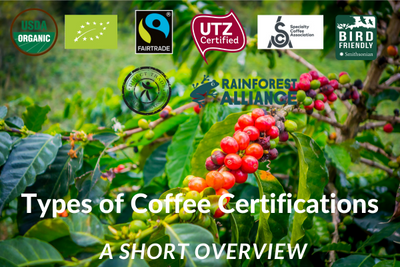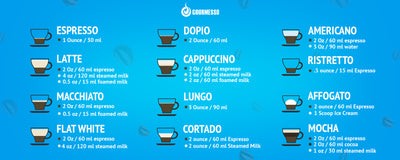We drink a lot of coffee. So much, in fact, that coffee is the world’s second most tradable commodity (oil is the first). Keeping that in mind, coffee is produced on a massive scale in some of the most fragile ecosystems, by farmers who often don’t make a fair, or even just, amount of profit for their labor.
The good news is that consumers are more conscious of their choices than ever. A study by New Cone Communications Research found that “More than nine-in-10 Millennials would switch brands to one associated with a cause.”
So, the desire for change is there, but that means nothing unless coffee drinkers know how to make informed decisions about where to get their favorite beverages. Thankfully, Gourmesso makes the ethical choice easy by offering the largest selection of Fairtrade coffee pods for Nespresso machines.
But What is Fairtrade?
The term “fair trade” was thrown around as early in the 1950s by travelers that bought produce and wares from the locals of the countries they visited. The travelers then sold what they bought in Europe and North America before bringing the profits back to the local artisans and farmers. Clearly, the intentions behind the inception of Fairtrade were good, but with no concrete regulations, there was no way to guarantee the profit made it back to the artisans and farmers that labored for its production. That’s why Fairtrade founder Paul Rice decided to make standards that would govern the way Fairtrade was monitored all over the world. He founded Fair Trade USA in 1977 and brought the certification model to large companies that sold commodity goods.
Since then, the Fair Trade USA has been committed to protecting and improving the lives of disadvantaged workers around the world.
Now that you know what Fairtrade is, here’s why it matters:
Buying Fairtrade is of the utmost importance because the certification offers protection to farmers against many forms of exploitation, such as discrimination, forced labor, and child labor.
Humane Labor
The coffee trade is rife with exploitation. In 2018, a plantation raid in Muzambinho, Brazil rescued workers from working conditions that can only be described as analogous to slavery. The workers were forced to buy their own equipment, so they began their jobs by owing their employer large sums of money that they had no choice but to work off before they saw any income. Their work days stretched as long as 14hrs and they went as long as three months without having a day off.
During a similar raid in Piumhi, 18 workers were rescued. It was reported that they were living in substandard housing with no sewage or running water. The plantation was also infested with bats and mice.
Buying Fairtrade is of the utmost importance because the certification offers protection to farmers against many forms of exploitation, such as discrimination, forced labor, and child labor.
Fair Wages
On average a plantation worker makes less than $2 a day. Due to climate change and the resulting unpredictability of the weather, and the increasing frequency of natural disasters, farmers are more at risk than ever of losing their income altogether.
Fairtrade protects the livelihood of workers by providing them with a constant income, so the success of their crops does not mean the difference between a steady paycheck and poverty.
That means when you buy Gourmesso’s Fairtrade coffee pods for Nespresso machines you are helping farmers that produce your cup of coffee maintain a steady income and livelihood.
Fairtrade Premiums
Not only do Fairtrade workers receive overall better payment and lifestyle, but their communities are also the beneficiaries of something called Fairtrade premiums. A Fairtrade premium is a sum of money that is put into a communal fund for a council of elected workers and farmers to use however they see fit—whether that is improving their infrastructure, or their social and economic conditions.
The amount of the Fairtrade premium is determined by the amount of produce sold. The amount differs from region to region, and the price is revisited once every three years and suitably adjusted to inflation.
When you purchase a pack of Gourmesso Fairtrade coffee pods, you’re not only getting a great selection of coffee, you’re also helping communities build schools, raise livestock, and improve their socio-economic standing.
The Environment
Not only does Fairtrade ensure that the people in every stage of the production and trade process are treated ethically, but it is also committed to protecting the environment.
Farmers describe climate change as one of the biggest threats they face. Fairtrade certified sites must comply with strict environmental standards to protect the precious ecosystems in which they reside. These standards apply to the improvement of soil and water quality, pest management, the avoidance of harmful chemicals, waste management, the reduction of greenhouse gas emissions, and the protection of biodiversity. To keep their certification, sites are regularly visited by consultants to make sure standards are being upheld.
Fairtrade doesn’t only help protect the environment, it also helps restore it. Many farmer-run cooperatives decide to invest their Fairtrade Premiums in reforestation. Cultivating new growth on degraded, cleared land, helps rejuvenate the soil and cleanses the air of carbon dioxide. Trees also harbor biodiversity, prevent soil erosion, and reduce the effects of climate change. Fairtrade also encourages farmers to grow trees and crops together. The decomposition of the leaves that fall from the trees make the soil more fertile, ensuring crops that thrive.
If you are consuming products cultivated in warm climates like coffee, teas, and some produce, it is of the utmost importance to make sure to look for a Fairtrade label. It is easier to enjoy a cup of coffee knowing your beverage choices aren’t putting the environment at stake.
Education
Fairtrade’s mission isn’t only to protect workers and the environment, it is also committed to the education of consumers so the choices they make are informed and aligned with their values.
The proof is there: when consumers are taught that seemingly simple choices, like choosing a brand of coffee, could affect the lives of entire communities and the future of the environment, they respond by supporting businesses they can get behind. Gourmesso makes the right choice easy by offering the largest assortment of Fairtrade coffee pods on the market.




